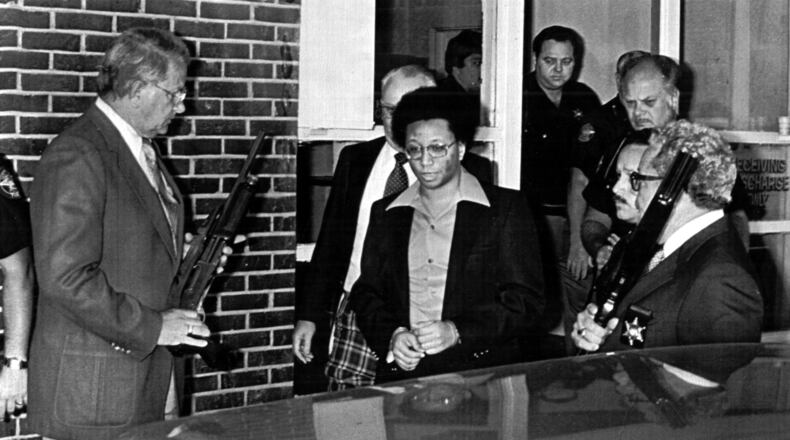(This story was originally published May 12, 2005)
For 22 years, Louis Graham was bothered by the belief that the wrong man was sent to prison for the infamous “Atlanta child murders,” a string of killings that terrorized the area in the early 1980s.
Now that he's police chief in DeKalb County, Graham is reopening some of the cases and unleashing a flurry of emotions throughout Atlanta.
The question of who killed as many as 30 African-American children and young men from 1979 until 1981 has lingered for years. Authorities say Wayne Williams, who is serving a life sentence for two of the murders, committed the string of killings. But many people, including Graham and family members of some of the victims, don't agree with the official conclusion.
Credit: Jenni Girtman
Credit: Jenni Girtman
"I never believed he did it, " said Graham, a member of the original police task force that investigated the slayings. On Wednesday he announced a new "cold case" squad charged with finding answers to several of the killings.
Flanked by grieving but optimistic parents, Graham said the squad would look into five slayings thought to have happened in DeKalb County and originally linked to Williams.
Graham tapped Sgt. Dave Fonseca, a 12-year veteran of the DeKalb police department, to head the task force. None of the members of the squad has ever worked on the case before, which Graham said "will give us fresh eyes and fresh ideas."
The chief said he wants to bring justice to the victims' families.
"I have always felt their pain, " he said. "You have to feel their pain and you try to do the best you can to help them."
A city's nightmare:
The string of disappearances and killings shook Atlanta. Officials imposed a curfew, parents hovered over their children, and people organized teams to search for missing children. Pressure built to arrest the killer before more bodies turned up.
Williams, a local free-lance photographer, was convicted in 1982 of killing Jimmy Ray Payne, 21, and Nathaniel Cater, 27, and sentenced to consecutive life sentences. He continues to maintain his innocence.
After the trial, law enforcement authorities said Williams was responsible for an additional 22 deaths. There was never any prosecution of those cases.
Though the cases were dubbed "missing and murdered children, " the victims ranged in age from 8 to 27. Nearly all were male.
Credit: Jenni Girtman
Credit: Jenni Girtman
Prosecutors contended that fibers, hairs and other evidence indicated a pattern of killings that included the deaths of Cater and Payne. Twenty-five years later, technological advances might help investigators make headway on the "cold" cases.
Fulton defends verdict:
Graham got his chance to revisit the cases six months ago, when he was named DeKalb police chief.
Local radio personality Frank Ski, knowing of Graham's doubts about Williams' guilt, approached the chief in March after he interviewed Williams at Hancock State Prison in South Georgia.
"Frank helped me speed up my decision, " Graham said.
The co-host of "Frank & Wanda In the Morning" on V-103 has been airing the Williams interviews this week. He has also talked to victims' parents, lawyers, police officials and listeners.
Hasan's Barber Shop in downtown Atlanta is buzzing about the case, said barber Monte Curry, 37, of Atlanta.
"Since it came back up, customers have asked have we listened to Frank Ski and then we talk about it, " he said. "I don't believe he [Williams] killed those children. I think it was just a cover-up."
While DeKalb police are taking another look, prosecutors in Fulton County, where most of the bodies were found, are convinced Williams is guilty.
"Our position is Wayne Williams was arrested, charged, tried and convicted. All of his appeals have been reviewed and his conviction has stood, " said Erik Friedly, a spokesman for the Fulton County district attorney's office.
Without new evidence that disproves Williams' guilt, the case is closed as far as Fulton County is concerned, Friedly said.
Parole always denied:
Jack Mallard, a former Fulton assistant district attorney who was instrumental in convicting Williams, said: "We charged him in the two killings where we had the strongest case. But we had significant evidence on the other 10."
Former Atlanta police Chief George Napper said "Good Morning America" asked him to appear on Monday's show, but he declined because he didn't see a need to "rehash" the issues. But Napper has no argument with the DeKalb chief.
"If Graham has something that can provide greater clarity to some of the issues, then that's fine, " Napper said. "That's a positive thing. Anytime you have a situation where there was no smoking gun and the cases were based on circumstantial evidence, there are always going to be those who have serious questions about what went on."
Williams has had four parole hearings since 1988, said a spokeswoman for the state Pardons and Parole Board. "He's been denied each time [because of] the nature of the offense, " Kim Patton-Johnson said.
The board is scheduled to reconsider Williams' parole status in October, she said.
The victims in the five DeKalb cases are:
> Patrick Baltazar, 11, found strangled Feb. 13, 1981, in a wooded area behind Corporate Square Office Park.
> Curtis Walker, 13, found dead of "asphyxiation/strangulation" March 6, 1981, in the South River near Flat Shoals Road.
> Joseph "Jo-Jo" Bell, 15, found dead of asphyxiation April 19, 1981, in the South River near Browns Mill Ferry subdivision, south of Lithonia.
> William Barrett, 17, found dead of asphyxiation May 12, 1981, beside Winthrop Road.
> Aaron Darnell Wyche, 10, found dead of a broken neck June 24, 1980, beneath a Moreland Avenue bridge.
A sixth child, Christopher Richardson, 11, was kidnapped from DeKalb County, but his body was found in Fulton.
"It's time for someone to step forward . . . so the parents can rest a little bit more than they have been, " said Jesse Griffin, 52, of Atlanta, Aaron Wyche's father.
"I've slept four hours at most since this incident happened. I'm hoping tonight I can have about two more hours added to that, knowing that this case is opened again and something's going to be done about it."
Staff writers Jeffry Scott and Beth Warren contributed to this article.
Keep Reading
The Latest
Featured





